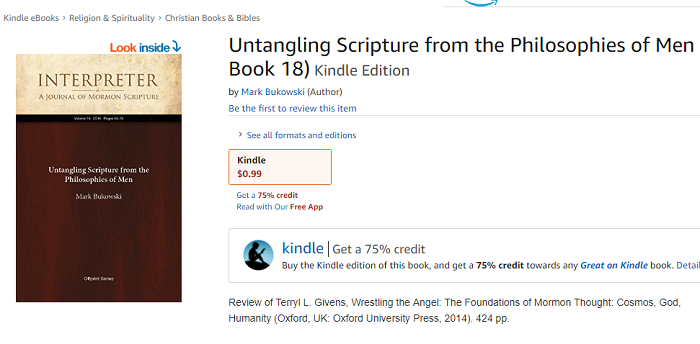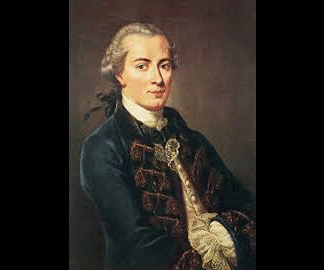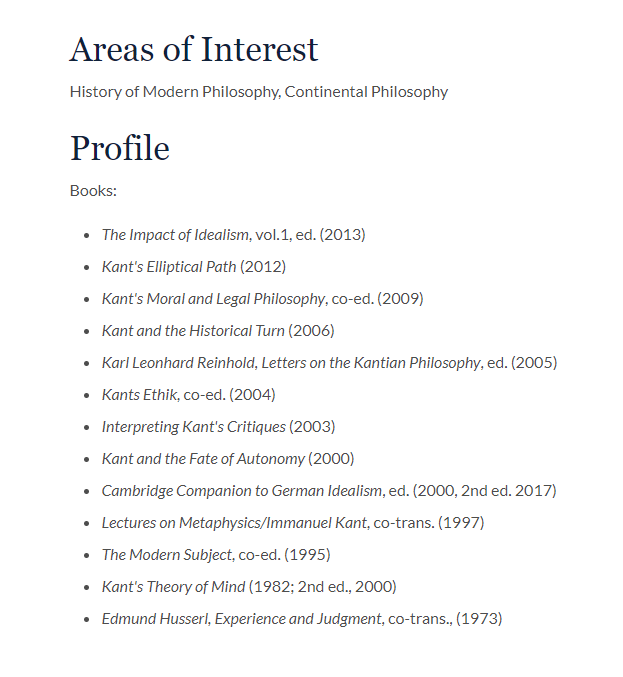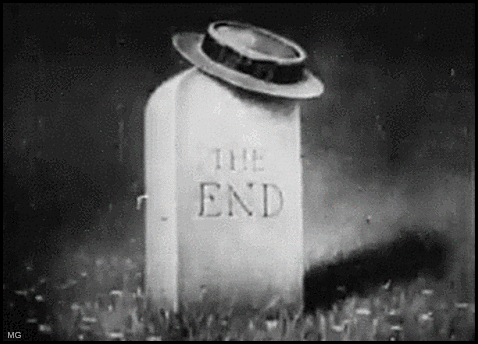Considering this story will revolve around a German philosopher here is the song ‘Hurra Die Welt Geht Unter’, the very song Chung remarked on, to accompany my tale.
So there I was this past holiday weekend; picking my way through Amazon and by the Fates known as the asbestosman algorithm I was recommended this:

It goes without saying that I was pretty impressed Mark got something up on Amazon that wasn’t self published. I decided then to read the abstract inadvertently got skylarked into a Kantian search I was not expecting:
Abstract wrote:Aspects of the philosophy of Immanuel Kant can be seen as laying a groundwork for much of contemporary American philosophy, Continental philosophy, and a possible basis for interpretations of these philosophies, which help rather than hinder the spread of the gospel. Kant’s concept of the synthetic a priori, for example, can help us understand how humans organize our individual ideas about reality from “matter unorganized,” perhaps in a way similar to how our “human” God organizes our world. Kant’s philosophy had vast influences, arguably resulting in a new way to see the relationship between God and mankind, which is compatible with the gospel.
Noice. I was not really sure how the “synthetic a priori” can help us understand anything about how God organizes our world, but if I knew Mark this was going to be an educational romp! Being the cheapskate that I am, I took advantage of the Interpreter Foundation’s generosity and skipped right over that ninety nine cent price tag to the free version hosted on their website.
Before I go further I feel compelled to include some comments about the Interpreter Foundation. It is important to note clearly how the foundation presents itself to the public, so consider this blurb from their ‘About’ page (bolding mine):
The Interpreter Foundation wrote:Our goal is to increase understanding of scripture through careful scholarly investigation and analysis of the insights provided by a wide range of ancillary disciplines, including language, history, archaeology, literature, culture, ethnohistory, art, geography, law, politics, philosophy, statistics, etc. Interpreter will also publish articles advocating the authenticity and historicity of LDS scripture and the Restoration, along with scholarly responses to critics of the LDS faith. We hope to illuminate, by study and faith, the eternal spiritual message of the scriptures—that Jesus is the Christ.
The following comment comes from Allen Wyatt over at the Mormon Dialogue and Discussion Board (bolding mine):
Allen Wyatt wrote:I should point out, as well, that there are a minute number of essays appearing in the Interpreter that are not peer reviewed. For instance, it makes little sense to arrange a peer review for a first-person essay, such as those that may appear around Christmas or Easter. The vast majority of articles, however, are peer reviewed extensively.
Who is Allen? Well he is the resident whipping boy and slave editor who puts in the lionshare of effort in making Interpreter’s flagship journal happen. He also happens to be one of the sitting Vice Presidents on the Interpreter Foundation’s executive board:
The Interpreter Foundation wrote:Allen Wyatt, an internationally recognized expert in small computer systems, has written more than 60 books explaining different facets of working with computers. He is the president of Sharon Parq Associates, a computer and publishing services company. Before serving with the Interpreter Foundation, Allen served as vice president of FAIR and founding president of the More Good Foundation. He has written articles for the FARMS Review and various online venues, including Meridian Magazine.
So when Allen Wyatt is telling you that the vast majority of articles published in the Interpreter’s flagship journal are peer reviewed extensively, you can take that guarantee to the bank. Besides, after reading this author bio, who is going to call that statement into question? (bolding mine)
About Mark Bukowski wrote:Mark Bukowski is a convert to the Church of Jesus Christ of Latter‑day Saints and has been a student of philosophy for over 40 years. He received a dual Bachelor’s Degree in Philosophy and Psychology at UCLA, studying with Robert C. Solomon, a noted scholar on 19th century German Philosophy, and Angela Davis, who was student of Marcuse. As an undergraduate, he became a student radical and atheist Marxist. In graduate school at the City University of New York, he studied William James and John Dewey under the tutelage of John J. McDermott and became convinced that personal religious experience could be seen as a valid way to justify statements about religion. He also agreed with Wittgenstein, that philosophical “problems” were often purely semantic misunderstandings and that language was often inadequate to express direct experience. These two philosophical insights proved to be life changing. He left academic philosophy but has remained an “armchair student” ever since. Influenced by James and Wittgenstein, he sought a church based on personal revelation and other principles he was convinced were true and found the Church of Jesus Christ of Latter-day Saints. He has served in various callings, was sealed in the Los Angeles Temple 35 years ago, and has four adult children.

Whew! There is a lot to say about this bio, but for the sake of brevity (too late!) I’d like to draw your attention to the bolded portion. If we are being honest here I had a hearty LOL moment when this bio goes out of it’s way to tell us just who Mark studied under and even why we should be impressed (Solomon is noted scholar of 19th century German Philosophy! Angela Davis was a student of Marcuse!), but Mark is a bit of pistol with a hair trigger, he’s liable to pop off at any given moment so I’m sure Wyatt and the others allow him his eccentricities.
Much to my surprise the name of Robert Solomon appears in the body of the article. Here is just a fragment of a sentence, but I want to highlight how Mark describes Robert Solomon:
Bukowski wrote:Robert Solomon, a noted Kant scholar, puts it this way...
I found the description of Solomon as a “noted Kant scholar” to be interesting. Now Solomon was a fairly popular philosopher (he died suddenly in 2007) who was associated with the University of Texas at Austin. It was actually news to me that he even taught at UCLA, but I learned from Mark that he did have a stint at UCLA early in his career. I must admit I don’t own any works by Solomon except an anthology of Nietzsche essays he edited with his wife called ‘Reading Nietzsche’. Here is the author bio given (italics in original):
Reading Nietzsche wrote:Robert Solomon is Quincy Lee Centennial Professor at the University of Texas at Austin. He is the author of From Rationalism to Existentialism, the Passions, In the Spirit of Hegel, and From Hegel to Existentialism.
Now in my own mind I had largely associated Solomon with Hegel, Phenomenology, and Existentialism. I really wasn’t aware he wrote much of anything on Immanuel Kant, it would certainly not be surprising if he had, he was more than capable of doing so. Yet that phrase “noted Kant scholar” bothered me, even at first blush it struck me as wrong. “Alfonsy, you fool!” I said to myself, “Mark studied under the man himself! And even Wild Wyatt Allen said these articles are peer reviewed extensively. If it says the man was a noted Kant scholar then it seems overwhelmingly obvious that he was!” Still my tutelage at Cassius University instilled in me the habit of following my gut, especially when it came to Mopologetics.
I have my own share of Kant material and I reasoned that if Robert Solomon was a “noted Kant scholar” then there is a fairly reliable metric to measure that; publications! My first move was to pull my copy of the ‘Cambridge Companion to Kant’ off the shelf. I anticipated that the Companion’s bibliography would surely contain some citation or mention of a “noted Kant scholar” from the 20th century and I could validate Mark’s offhand comment. Here is how the bibliography described itself:
Cambridge Companion to Kant wrote:The literature on Kant, as might be expected from both the range of his work and his centrality in the history of modern philosophy, is enormous. The following bibliography is necessarily selective. In view of the aims of the present series, it focuses on recent books and collections of articles, although including some older works that have attained classical status. Only very important articles that have not been republished in collections by their authors or anthologies have been listed separately; individual articles in collections that are included are not listed separately The bibliography also emphasizes works in English, although some of the most important works in German and a few in French have been included. Books that include especially extensive bibliographies are noted.
The division of the following bibliography reflects the customary broad divisions in discussions of Kant’s philosophy. More specialized works on Kant’s philosophy of physical science, politics, and biological science, have been listed separately, but some of the more general works in the divisions that they follow also treat of these issues. Many works fit even less neatly into these divisions, which are intended only to help the reader get started. (pages 449-450)
The bibliography continues on to page 471 and no one with the name Solomon is listed. Here is a list of each subject heading to give readers the scope of subjects broached:
-Kant’s Works: German Editions.
-English Translations
-Background and Context
-Biographies and General Surveys
-Theoretical Philosophy: Epistemology and Metaphysics
-Theoretical Philosophy: Philosophy of Physical Science
-Practical Philosophy: Moral Theory
-The Third Critique: Comprehensive Studies and Aesthetics
-The Third Critique: Teleology and Philosophy of Biology.
-Philosophy of History and Anthropology
-Philosophy of Religion
-Reference Works
I noted with some regret that Kant wrote extensively about religion and Mark had decided to forego those areas to quote from Solomon’s 19th century background to Existentialism. Even my meager Kant selection contains Wood and Clark’s translation of Kant’s ‘Lectures on Philosophical Theology’ and Greene and Hudson’s translation of of Kant’s ‘Religion within the Limits of Reason Alone’ which would seem to have much more in common with Givens’ topographical book about Mormon religious thinking that Mark is ostensibly reviewing.
My doubts were starting to compound. Mark tells us in his author bio that Solomon was “a noted scholar on 19th century German Philosophy” but Kant’s activities are largely confined in the 18th century (he died in 1804) and when Mark characterizes Solomon as “noted Kant scholar” he isn’t quoting from a book or article about Kant, but a book about the 19th century background of Existentialism. I shook it off and doubted my doubts, looking at just one bibliography isn’t going to settle the matter.
Next I thought I’d consult the entry for Kant in the ‘Oxford Companion to Philosophy’ and see what they gave in terms of bibliography. The entry for Kant is expectedly lengthy and was written by a fellow of the name of Henry E. Allison. If you look him up under the Emeriti faculty list at U.C. San Diego you’ll see his professional interests listed as follows:
Kant, Spinoza, German idealism, and eighteenth and nineteenth-century philosophy
Lots of overlap with Solomon of course, but did you notice how Kant is listed specifically by name? Regardless, at the end of the entry on Kant there are only four titles listed as bibliographic resources: ‘Kant’s Transcendental Idealism’ by Henry Allison, ‘Kant’s Life and Thought’ by the Neo-Kantian (and personal adversary of Heidegger!) Ernst Cassirer, Paul Guyer’s anthology ‘The Cambridge Companion to Kant’, and the Czechoslovakian philosopher Stephan Körner’s ‘Kant’.
I continued to doubt my doubts. I took my ‘Columbia History of Western Philosophy’ off my shelf and flipped to the 18th century section to find the Kant entry written by a fellow called Karl Ameriks whose on emeritus status at Notre Dame. Here is a quick screenshot from his faculty page:

While Amerik’s bibliography is not as extensive as the ‘Cambridge Companion to Kant’ it was longer than the meager one offered in the “Oxford Companion to Philosophy’ and so I held out hope that Robert Solomon might be included. Once again I found Henry Allison’s ‘Kant’s Transcendental Idealism’, a journal article from Amerik called ‘Recent Work on Kant’s Theoretical Philosophy’, one of the few of Kant’s American translators Lewis W. Beck’s ‘Commentary on Kant’s Critique of Practical Reason’, Paul Guyer’s ‘Kant and the Claims of Knowledge’ and Guyer’s edited anthology ‘The Cambridge Companion to Kant’ were also listed, John Kemp’s ‘The Philosophy of Kant’, Peter Strawson’s ‘The Bounds of Sense: An Essay on Kant’s Critique of Pure Reason’, Roger Sullivan’s ‘An Introduction to Kant’s Ethics’, Allen Wood’s ‘Kant’s Rational Theology’, and lastly Guenter Zoeller’s journal article ‘Main Developments in Recent Scholarship on the Critique of Pure Reason’.
I was quickly running out of reference works to consult, but I had one last resource in ‘Philosophy 2: Further Through the Subject’ that had a very lengthy chapter on Kant by Sebastian Gardner of University College London:
Sebastian Gardner wrote:My earliest research interest, which materialised in my first book, was in the philosophy of psychoanalysis. Since then my work has concentrated chiefly on Kant and post-Kantian philosophy. I have written on Fichte, Schelling, Schopenhauer, Nietzsche, Sartre, Merleau-Ponty, and the aesthetic turn in post-Kantianism. A collection of papers that I co-edited with Matthew Grist, The Transcendental Turn (OUP), appeared this year. I am presently working on the legacy of Kant's Third Critique.
Gardner’s chapter is fairly lengthy starting on page 576 and doesn’t get to the bibliography until page 653 and the bibliography runs until page 657 where a master list of references is alphabetically ordered. Gardner ultimately references an impressive 111 philosophers and scholars (!!!) in his chapter and the attending bibliography. Alas, Robert C. Solomon is not included.
At this point I was simply flummoxed, Mark told us that he studied under Solomon at UCLA which seems to indicate some kind of personal relationship with the man. Would someone say in print that they studied under Robert Solomon when in actuality they had only taken a class from Robert Solomon? Perhaps, but not Mark and his bio tells us he graduated with a dual degree in philosophy and psychology and Robert Solomon’s own PhD was in Psychology and Philosophy. I thought the the implicit idea was that Mark was so influenced by Solomon that he ended up with similar degrees.
How much time could Mark have conceivably spent with Solomon? Solomon earned his PhD from the University of Michigan in 1967 and by 1972 he had moved to the University of Texas at Austin where he would spend the rest of his life. So we can roughly guess that Solomon could have spent anywhere from 3 to 5 years at UCLA where a young Mr. Bukowski could have studied under him. Yet there is another complication, between being awarded his PhD and his moving to Austin Texas he also taught courses at the University of Auckland in New Zealand, University of Pittsburgh, University of Pennsylvania, Princeton University, and Mount Holyoke College, in addition to UCLA where Mark spent his undergraduate years. How much time could Mark have ever spent with Solomon? I was left with only questions and no satisfactory answers.
With my own personal resources exhausted I took to the internet in a desperate effort to substantiate Mark’s descriptor of Solomon as a “noted Kant scholar”. I checked the Kant entries on both the ‘Internet Encyclopedia of Philosophy’ and ‘Stanford Encyclopedia of Philosophy’ only to find no mention Robert Solomon. Digging a little deeper into the Stanford Encyclopedia I saw Robert Solomon being mentioned on pages having to do with Hegel's Dialectics, Faith, Sex & Sexuality, Friedrich Nietzsche, and Love, so it isn't like the man's work isn't unknown on the website.
The last of my efforts were spent on Google Scholar and Philpapers searching for an article or book authored by Robert C. Solomon on Kant and my search was fruitless, I found nothing. I can’t seem to find any evidence that Solomon wrote about Kant and his work exclusively. I did stumble on to this blog post by the philosopher Brian Leiter who maintains a popular industry blog where he polled his readers on the best Anglophone and German scholars of Kant since 1945:
Brian Leiter wrote:Despite being a rather specialized topic, the poll attracted over 320 votes. Since there were fewer choices here (even with write-ins, only about 40), I'm going to list only the top ten by way of results, though the full results are available.
1. Henry Allison (Condorcet winner: wins contests with all other choices)
2. Paul Guyer loses to Henry Allison by 122–90
3. Allen Wood loses to Henry Allison by 125–79, loses to Paul Guyer by 126–74
4. Karl Ameriks loses to Henry Allison by 145–51, loses to Allen Wood by 107–85
5. Tied:
Lewis White Beck loses to Henry Allison by 143–55, loses to Karl Ameriks by 89–82
Dieter Henrich loses to Henry Allison by 134–62, loses to Karl Ameriks by 91–84
7. P.F. (Peter) Strawson loses to Henry Allison by 150–53, loses to Lewis White Beck by 98–81
8. Michael Friedman loses to Henry Allison by 149–45, loses to P.F. (Peter) Strawson by 91–84
9. Beatrice Longuenesse loses to Henry Allison by 160–36, loses to Michael Friedman by 87–70
10. Christine Korsgaaard loses to Henry Allison by 161–51, loses to Beatrice Longuenesse by 91–82
Ignoring the ordinal order, this is a fairly plausible top ten. (Not far outside the top ten were Onora O'Neill, Eckart Forster, Frederick Beiser, and Barbara Herman.) An amusing aside, however, about the peculiarities of the American Academy of Arts & Sciences: every philosopher in the top ten is (or was) an elected member of the American Academy of Arts & Sciences except for Henry Allison. Indeed, it looks like the top ten in all the prior polls are (or were) elected members, with the exception of #7 in epistemology, Ed Gettier. Certainly the #1 philosopher in all the other polls has been an elected member. Now perhaps the explanation for this is just that those voting here are less discerning than the members of the Academy when it comes to Kant scholarship. The other possibility is that Allison just lacks the right friends: after all, he took his PhD at the New School, and spent his entire career largely outside highly ranked departments (though UC San Diego towards the end of his tenure there became a very strong program overall).
Comments are open for discussion of the results. Remember that only scholars who did their major work in the post-WWII period and, in the case of living scholars, who are over 60 were included in the poll.
It seems Robert Solomon was passed over for inclusion, which would seem to conform with everything I found thus far. I had to be dragged kicking and screaming, but eventually I arrived at the conclusion Robert Solomon could not categorized as a scholar of Kant.
As I write this I still refuse to think Mark actually wrote that Robert Solomon was a noted scholar of Kant. For one he studied under the man and second; Mark is one of the most competent readers of philosophy at the Mormon Dialogue and Discussion Board. I’d sooner believe that an errant editor at the Interpreter inserted that aside than believe that Mark would tell us he studied under man only to either intentionally or ignortantly misrepresent that man’s career. What is to be gained from having doing so? If we read Mark’s posts at MD&D we find a man who has a remarkable command of the Western philosophical canon, it really isn’t conceivable he’d make so basic an error.
What do the good people here think? Should I contact Allen Wyatt and inform him of the mistake? Would they issue a correction? Would they even care? Or should I should I simply shrug and say, “Bukowski lol” as so many are wont to do?
